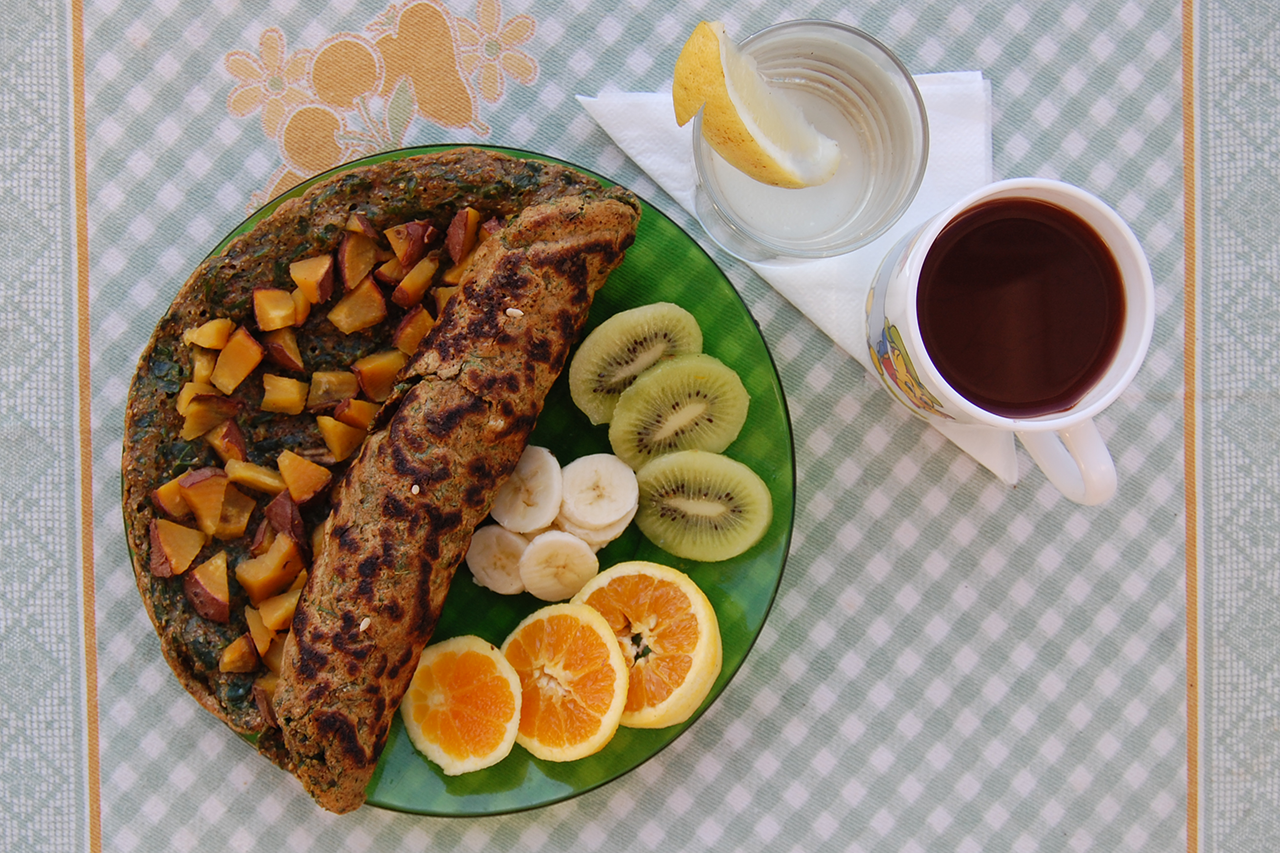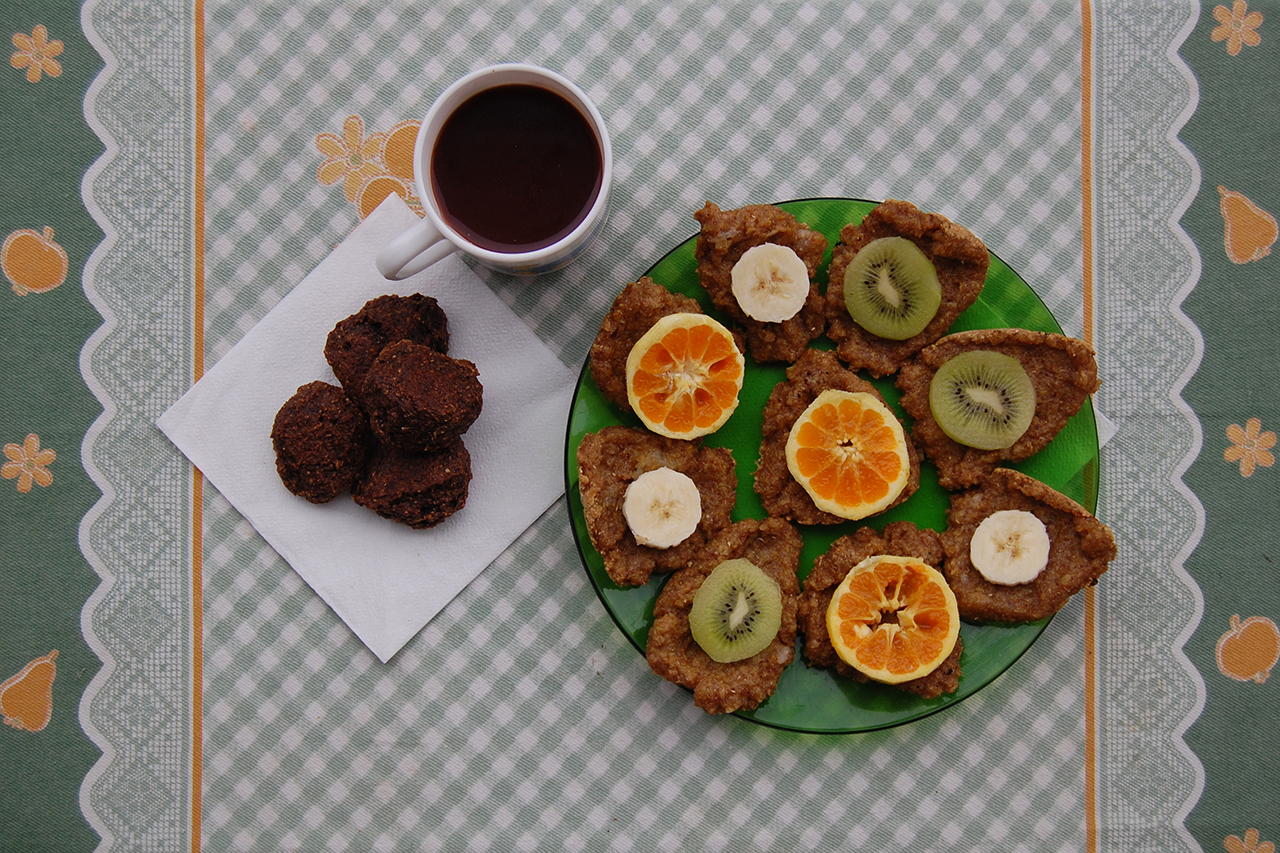Alimentos com fibra são muito importantes e devem estar sempre presentes em todas as refeições.
Mas para uma absorção mais lenta dos açucares das frutas estas devem ser comidas sem que a fibra seja triturada muito fina.
A informação científica diz que há muita diferença em comer 2 peros e 2 laranjas e fazer um copo de sumo (smoothie) com estes mesmos 4 frutos triturados muito finos.
Pequeno almoço

Almoço

Merenda das 7

Fruta inteira vs triturada
EN - Texto Original
What would happen, though, if you put those four and a half cups of sliced apples in a blender with some water and pureed them into an apple smoothie? Despite still having all the fiber, it still caused that hypoglycemic dip. The rebound fall in blood sugars, which occurred during the second and third hours after drinking juice and puree, “was in striking contrast to the practically steady level after eating apples.” This finding not only indicates how important the presence of fiber is, but also perhaps whether or not the fiber is physically disrupted, like in a blender.
Let’s play devil’s advocate. Eating four and a half cups of apples took 17 minutes, but drinking four and a half cups of apples in smoothie form only took about 6 minutes, and you can down two cups of juice in about 90 seconds. So, maybe these dramatic differences have more to do with how fast the fruit entered our system rather than its physical form. If it’s just the speed, we could simply sip the juice over 17 minutes and it should be the same, right? Researchers put it to the test.
They found this had the same results as drinking quickly. So, it wasn’t the speed—it was the lack of fiber. What if you disrupt that fiber with blending but sip it as slowly as the apple eating? The results were a little better, but not as good as just eating the apple. The take-away? Eating apples is better than drinking apple smoothies.
Fonte: Smoothies vs Whole Fruit: What Does the Science Say?
https://www.care2.com/greenliving/smoothies-vs-whole-fruit-what-does-the-science-say.html
PT - Tradução computorizada
O que aconteceria, no entanto, se você pusesse quatro xícaras e meia de xícaras de maçã fatiadas no liquidificador com um pouco de água e as misturasse em um suco de maçã? Apesar de ainda ter toda a fibra, ainda causou esse mergulho hipoglicêmico. A queda no açúcar sangüíneo, que ocorreu durante a segunda e terceira horas depois de beber suco e purê, “estava em notável contraste com o nível praticamente estável depois de comer maçãs.” Esse resultado não apenas indica a importância da presença da fibra, mas também talvez se a fibra é ou não fisicamente quebrada, como no liquidificador.
Vamos brincar de advogado do diabo. Comendo quatro e meia xícaras de maçãs levou 17 minutos, mas beber quatro e meia xícaras de maçãs em forma de smoothie levou apenas cerca de 6 minutos, e você pode descer duas xícaras de suco em cerca de 90 segundos. Então, talvez essas diferenças dramáticas tenham mais a ver com a rapidez com que a fruta entrou em nosso sistema, em vez de sua forma física. Se é apenas a velocidade, podemos simplesmente beber o suco por 17 minutos e deve ser o mesmo, certo? Pesquisadores colocam isso em teste.
Eles descobriram que isso tinha os mesmos resultados que beber rapidamente. Então, não foi a velocidade - foi a falta de fibra. E se você interromper essa fibra com a mistura, mas beber tão lentamente quanto a maçã comer? Os resultados foram um pouco melhores, mas não tão bons quanto apenas comer a maçã. O take-away? Comer maçãs é melhor do que beber smoothies de maçã.
Informação de fibra (en)
Smoothies vs Whole Fruit: What Does the Science Say?
https://www.care2.com/greenliving/smoothies-vs-whole-fruit-what-does-the-science-say.htmlMaking the Case for Eating Fruit
https://well.blogs.nytimes.com/2013/07/31/making-the-case-for-eating-fruit/What is the Difference Between Soluble and Insoluble Fiber?
https://www.quickanddirtytips.com/health-fitness/healthy-eating/what-is-the-difference-between-soluble-and-insoluble-fiber



























